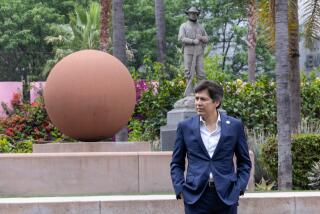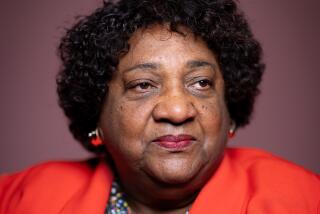Activist, 90, Sees the Fruits of Her Labor for Equality
- Share via
Ruby McKnight Williams has 19 commendations on her living room wall, and a drawerful that she hasn’t gotten around to framing yet.
One was awarded to her in 1983 for 50 years of service to the Pasadena National Assn. for the Advancement of Colored People, of which she was president for 16 years, and where, at 90, she still works two afternoons a week.
But during a recent interview, she was not interested in dwelling on her accolades, which include being named president emeritus of the NAACP branch. Instead, she said, “I want to give you my experience.”
As it turns out, Williams’ story provides a window on 60 years of the black experience in the San Gabriel Valley.
She came to Pasadena in 1930, eager to continue the kindergarten teaching she had begun in Topeka, Kan., where she was born.
“My great-grandfather was the first in the family to come to California,” she said. “He came cross-country in 1849 as a cook for a wagon train. When he came back and talked about picking oranges off the trees, my grandmother kept in mind, ‘California.’ She came out here in 1906.”
She reached for a photo of her four uncles, all in Army uniform. “They served in the Spanish-American War and then came out to California,” she said. “My mother followed, and I followed her. The first thing I did after arriving was to join the NAACP.
“It’s hard to picture Pasadena as it was when I came here. People can’t visualize how limited it was for blacks.
“It was after the Great Depression, and in Los Angeles they weren’t hiring teachers. In Pasadena they told me they don’t hire black teachers.
“So I looked in the paper and saw that there was a professional women’s employment service. They were quite surprised to see me. It seems that they didn’t expect my race to come into the place.
“They asked me if I’d like to be a governess, and I said, ‘No, not necessarily.’ Then the manager came out to speak to me, and I was hired to take over the new colored women’s department of the Pasadena Employment Service. The service was later taken over by the state.
“I found out,” she said, “that no (black) men were employed by Pasadena except garbage men and two or three men who swept around City Hall. As for (black) women, even the attendants in the restrooms at the Rose Bowl had never been colored. Things as simple as that.
“I once insulted the Pasadena Board of Directors. I said, at a meeting, ‘What’s the difference between Pasadena and Mississippi? Except for the sunshine, I don’t see any difference.’
“One of them said, ‘Then why don’t you go to Mississippi?’ and I answered, ‘Because it’s beautiful here.’
“Thursday was my field day. I used to go up and down Colorado Street and surprise everybody by asking about employment for colored women. (One man) who owned a department store in Pasadena said, ‘I wouldn’t have a customer left if I hired a colored clerk.’ I told him, ‘I’m going to wait around until that day comes.’ ”
During her NAACP tenure, Williams took up the cause of school and housing desegregation. Twice, she visited the U.S. Supreme Court to witness integration decisions. She also fought and won local redevelopment battles. Meanwhile, in 1946, she married Melvin Williams, and together they worked to beautify their neighborhood and street. In 1966, Westgate Street won a Pasadena Beautiful Award. Melvin Williams died in 1988.
Although the couple never had children of their own, she said working with young people was her greatest satisfaction. She served for six years as adviser to the NAACP National Youth Work Committee. She’s convinced that educating black children to believe in themselves is the key to equality.
“When I was a child and a group of children called me and my brother ‘niggers,’ I came home and told my mother. ‘Is that your name?’ she asked. I said, ‘No.’ My mother said, ‘Then they weren’t talking to you.’ After that my brother and I were able to face that group without running.
“You have to start when they’re young--to put into their heads, ‘You can do anything that any other kind can do. “


